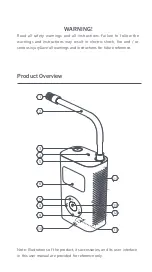
A-19
Appendix C
Technical
Bulletin
Bulletin No:
Effective Date:
Cancels:
Page: 1 of
Subject:
© 2010 Bendix Commercial Vehicle Systems LLC All rights reserved. 3/2010 Printed in U.S.A.
TCH-008-021
3-5-2010
PRO-08-21 dated 2-6-2008
2
Air Brake System - Cold Weather Operation Tips
As the cold weather approaches, operators and fl eets alike begin to look to their vehicles with an eye toward
“winterization”, and particularly what can be done to guard against air system freeze-up. Here are some basic
“Tips” for operation in the cold weather.
Engine Idling
Avoid idling the engine for long periods of time! In addition to the fact that most engine manufacturers warn that
long idle times are detrimental to engine life, winter idling is a big factor in compressor discharge line freeze-up.
Discharge line freeze-ups account for a signifi cant number of compressor failures each year. The discharge
line recommendations under “Discharge Lines” are important for all vehicles, but are especially so when some
periods of extended engine idling can not be avoided.
Discharge Lines
The discharge line should slope downward from the compressor discharge port without forming water traps,
kinks, or restrictions. Cross-overs from one side of the frame rail to the other, if required, should occur as close
as possible to the compressor.
Dryer Inlet Temperature
The dryer inlet air temperature should typically be within the range of no more than 160°F and no less than 45°F
above low ambient (surrounding) temperature to prevent freeze-ups. (For example, if low ambient is minus
40°F, the dryer inlet must be above 5°F.) Lower dryer inlet temperatures should be avoided to minimize the risk
of freeze-up upstream of the air dryer. Higher temperatures should also be avoided to minimize the risk of heat
damage to the air dryer seals and to avoid a loss of drying performance.
Compressor Line Size
The line size and length is established by the vehicle manufacturer and should not be altered without the vehicle
manufacturers approval. As a reference, the line length from the compressor to the air dryer should be less than
16 feet and the minimum line sizes should be as follows:
Line Insulation
To guard against freez-ups in Low Duty Cycle applications, the discharge line can be insulated if it is greater
than 9 feet in length. The line can only be insulated back to 9 feet and a maximum of 3 feet. For example, if
the line is 10 feet, insulate the fi tting and the last one foot of the line. If the line is 15 feet, insulate the fi tting and
the last 3 feet of the line.
Minimum
Length
Minimum
I.D.
Application
6 ft.
1/2 in.
Low Compressor Duty Cycle Applications (0-20%)
10 ft.
5/8 in.
High Compressor Duty Cycle Applications (20-40%)
Summary of Contents for 360CC
Page 12: ...12 Notes...






































